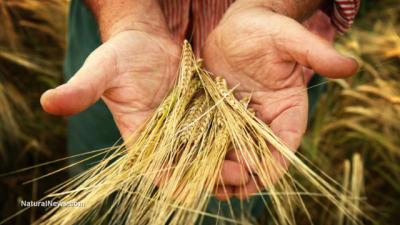

(NaturalNews) Advances in conventional breeding techniques have now rendered genetic engineering obsolete, according to a report authored by independent scientist Benno Vogel and published by Greenpeace. Indeed, the conventional breeding technique known as marker-assisted selection (MAS) allows farmers to rapidly develop new strains of important crops, without the high costs or dangers of genetic engineering.
Genetic engineering, which produces genetically modified organisms (GMOs), consists of using biotechnology techniques to alter the DNA of organisms. In contrast, MAS uses biotechnology only to identify genetic markers linked to traits that farmers find desirable, such as pest or drought resistance. Armed with this more specific information about a plant's genetics, farmers are able to use conventional breeding techniques to produce new strains much more rapidly -- and much more quickly and effectively than can be delivered by genetic engineering.
More successful than GMOs
In the short time since its development, MAS has already delivered remarkable successes leading to real-world benefits in food production. For example, the Greenpeace report cites the use of MAS to develop new strains of rice that are resistant to bacterial leaf blight, a major threat to irrigated and rain-fed rice crops in China, India and Indonesia. MAS has also been used to nearly eliminate rice blast in Korea and Thailand, which formerly led to the loss of up to 30 percent of the annual harvest.
Other MAS successes include the development of North American wheat with fungal resistance, cassava in Nigeria and Tanzania resistant to cassava mosaic disease, striga resistance in sorghum in Sudan and other African countries, and downy mildew resistance in pearl millet in Northern India. Beyond disease resistance, MAS has also delivered varieties of rice that are tolerant to both floods and droughts.
"Ten years ago, MAS was in its infancy, but is now so commonplace that it isn't always possible to determine whether a variety has been developed using MAS or traditional conventional breeding," Vogel wrote. "This throws a sharp light on the GE crop controversy, which has been going on for over 20 years, but with little development beyond the limited range of herbicide tolerant and insect resistant traits in major commodity crops."
Local control essential
Because MAS merely makes additional information available to farmers who are engaging in conventional crop breeding, it does not carry the same risks as genetic engineering, such as genetic pollution or the potential production of toxic chemicals or new food allergies. Conventional plant breeding is highly effective at producing complex, multi-genetic traits -- unlike genetic engineering, which can only modify traits produced by a single gene at a time.
Greenpeace notes that, while genetic engineering is often touted as a solution to problems of global hunger in a time of climate change, the money- and technology-intensive technique has yet to produce a single commercially viable crop variety with any trait other than pesticide production or herbicide resistance.
"In light of the proliferation of MAS in plant breeding, and the successful delivery of useful traits, GE crops are simply not necessary," Greenpeace wrote.
Another advantage of MAS and other conventional breeding techniques is that they leave the power in the hands of individual farmers, the report notes. This leads to crops more appropriate for local environmental and cultural needs.
"There is no doubt that a global shift to ecological farming practices is now needed," the Greenpeace website reads. "MAS is a modern and innovative plant breeding tool that could be, and should be, orientated towards developing varieties that assist this shift."
"The full benefits of MAS, however, will only become clear if it is an open source technology without industry patents on the techniques, as is common with genetically engineered (GE) crops."
Sources for this article include:
http://www.greenpeace.org
http://www.greenpeace.org
http://www.greenpeace.org[PDF]
http://science.naturalnews.com
Original article: http://www.naturalnews.com/053977_marker-assisted_selection_conventional_breeding_GMOs.html

